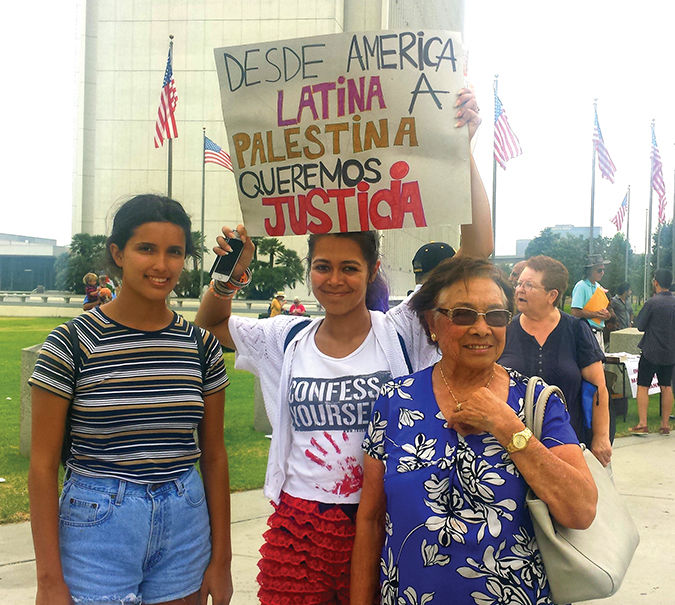“Free, free Palestine!”
“Gaza, Gaza don’t you cry! We will never let you die!”
Chanting, marching and waving flags, signs and banners in front of the Federal Building in Westwood, some 1,500 demonstrators protested Aug. 2 on behalf of Palestinians in the Gaza Strip, site of violence and bloodshed in recent weeks.
Organized by the Los Angeles chapter of ANSWER (Act Now to Stop War and End Racism) and several co-sponsors, the afternoon rally was the fifth local pro-Palestine protest in four weeks urging Israel to stop its military operation in Gaza. The event featured speakers addressing the current violence in Gaza and sharing personal stories about how the conflict has impacted them and their families.
Since July 8, more than 1,800 Palestinian civilians and 66 Israelis (mostly soldiers) have died from the violence, which pro-Palestinian forces blame on Operation Protective Edge, the Israeli military’s offensive.
Palestinian-American Abir ElZowidi, a resident of Los Angeles, recounted the recent heart-wrenching loss she is trying to cope with daily: the violent deaths of family members, killed in their own home in Gaza.
“A few weeks ago, five members of my family — including two small children, two and six years old — were killed in their house in my village, Beit Hanoun, while baking their bread for the day, wishing to share it together, praying to God to spend one more day with each other while they are watching Israel randomly bombing their neighbors,” recalled ElZowidi in an emotional voice. “The Palestinian people in Gaza cannot even hide safely in their homes — innocent children are getting killed while sleeping between their moms and dads.
“I say to all of our Jewish friends, our American friends: join us and speak up loudly against the Israeli crimes being committed against humanity,” she added, concluding by loudly proclaiming, “Free Palestine! Free Palestine! Free Palestine!”
Michael R. Patin, a parishioner at the Cathedral of Our Lady of the Angels in Los Angeles, described the continued bombing of the people of Gaza as inhumane, causing an increasing death toll that includes more than 350 children.
“This invasion has been condemned by an overwhelming majority in the international community, and the United Nations has been pleading for it to stop,” said Patin, a life-long human rights activist and former member of ANSWER. He attended the rally, he told The Tidings, to help “get the word out [about] what so many have been calling for, including Pope Francis and the Vatican: an end to the siege of Gaza, to end the blockade of Gaza, so that the Palestinian people can live as human beings, free from living in the largest open air prison in the world.”
For Patin, his Catholic faith is inextricably linked with his activism.
“My faith as a Roman Catholic gives meaning to my activism, and my activism gives expression to my faith,” he explained. “The principles of being Catholic challenge me to be aware of the fact that I'm also part of the universal body of believers. There can be no real meaningful peace unless there is real justice in our world — and where there is injustice, we must acknowledge that injustice.”
About two hours after the protest began, police closed down a portion of Wilshire Boulevard, allowing demonstrators to march through the street and pass underneath the 405 Freeway underpass at Sepulveda Boulevard as they made their way to the nearby Israeli consulate (which was closed for the day).
Paula Kahn, who attended the rally with her grandmother and a friend, carried a sign with a message of international solidarity: “From Latin America to Palestine: We want justice.” In her own family — which has both Catholic and Jewish roots — Kahn’s Jewish ancestors were forced to flee Europe decades ago and they immigrated to Chile.
Had her forefathers been killed, just as so many Palestinians are being killed today, she told The Tidings, “I wouldn’t be here today. That’s why I’m here today, because I feel a connection to their plight.”
Israel and Hamas, which has controlled the Gaza Strip for eight years and is considered a terrorist organization by the U.S., agreed to observe a 72-hour cease-fire on Aug. 1 after weeks of violence. The truce fell apart less than two hours later, after the Israeli military claimed Hamas had attacked two of their soldiers and captured one (though it was later discovered that the soldier had actually been killed in combat in Gaza). A new 72-hour cease-fire began the morning of Aug. 5.

